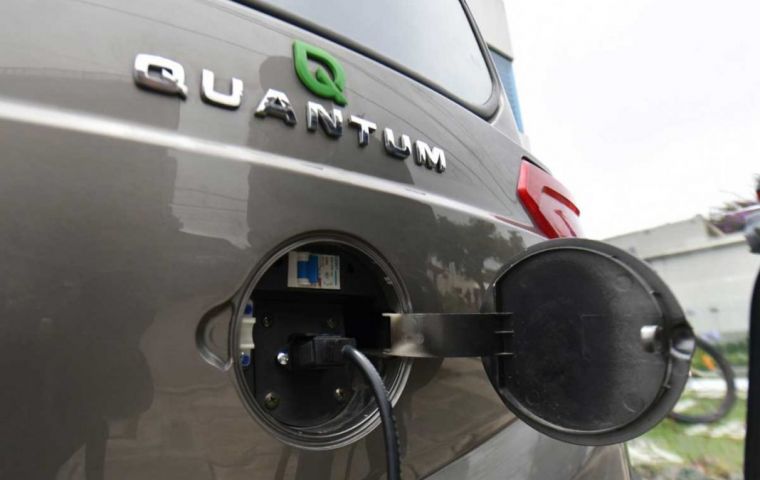MercoPress. South Atlantic News Agency
Argentina and Bolivia have bills in Parliament to boost transitioning to e-cars
 Montenegro explained Bolivia also intends agriculture vehicles to be powered by ecofriendly sources of energy
Montenegro explained Bolivia also intends agriculture vehicles to be powered by ecofriendly sources of energy Just as the European Commission sent a bill last week to the European Parliament regarding electric vehicles, the Governments of Argentina and Bolivia are also taking similar paths.
The Argentine government said last week it shall need to boost local production of electric cars because it foresees a lack of US dollars to import them
“Towards the end of this decade, a conversion towards electric vehicles is coming and we are going to work with a law to stimulate national production. If we remain as a mere taker of technological resources from other countries, in addition to losing Argentine production and job opportunities, we will not have the dollars to import“, said Matías Kulfas, Minister of Productive Development.
The Minister made those remarks during the launch of the Green Productive Development Plan, which envisions the use of lithium and copper extracted for Argentine territory the development of car batteries as the reconversion from combustion engines to electrified ones seems inevitable.
Kulfas explained that to achieve those goals “mining is key,” since the industry will demand lithium and copper. Therefore he called for ”sustainable mining that cares for the environment and incorporates a value chain.“
This plan is in line with the Electromobility Bill that the National Government sent to Congress in March, whereby the production of vehicles that run on fossil fuels would be banned as of January 1, 2041.
As it happened with the European bill, it is now up to Congress to decide on the issue.
Kulfas underlined the Government was working side by side with automakers, auto parts companies and unions, although the electromobility plan did not go down well with local manufacturers, who have expressed their disappointment for not having been consulted before sending the bill to Congress. They also believe the Government needs first to solve other more urgent issues, such as high tax pressure.
Argentina is fertile land in terms of the presence of lithium, one of the key raw materials for electromobility, necessary for the production of batteries for electric cars. According to a 2018 report, 67 per cent of proven lithium reserves, and around 50 per cent of global supply, are concentrated among Argentina, Bolivia and Chile, due to which the region became known as ”the lithium triangle.”
Argentina “is the country with the greatest amount of resources with potential economic value, although not of proven feasibility and profitability, with just over 20% of the world total. The lithium available there is mainly concentrated in three provinces: Catamarca, Jujuy and Salta,”, the USGS report said.
For the Inter-American Development Bank (IDB), “Argentina has the potential to become the world's leading producer of lithium carbonate, by taking the benchmark commonly used to measure the productivity of the sector.”
BMW has already confirmed an investment of 285 million euros to extract lithium from Argentina from 2022 and use it in the production of batteries for its electric cars. The supplier of the German brand will be Livent, a North American company based in Catamarca.
Meanwhile, Bolivia had scrapped tariffs for the import of electric and hybrid vehicles and their spare parts, in addition to other tax benefits.
Economy Minister Marcelo Montenegro announced last week that the measure sought to “contribute to the improvement of the environment” and “energy-saving and efficiency” in the country through the “manufacture, assembly, purchase and import of vehicles and electrical agricultural machinery.”
”This tax incentive establishes a 0% rate for the tariff tax and a decrease in the Specific Consumption Tax (ICE) for these electric and hybrid vehicles, in such a way that a favourable environment can be generated so that we can use this type of vehicle and save some energy,“ he added.
”Financial incentives“ were also established for the manufacture, assembly and purchase of agricultural machinery and electric and hybrid vehicles, as well as equipment and accessories for the corresponding energy and distributed generation systems, the minister went on.
The aim is to promote the creation of ”assembly plants” for this type of vehicle and machinery in the country to save energy, the authority said.
According to Montenegro, the norm establishes that the infrastructure of the recharging system for electric vehicles will be in charge of the state-owned National Electricity Company (ENDE), with the possibility that private investors can also do so if they so wish.
“We are convinced that this type of regulation will encourage, help the national economy, save energy and move to another phase where the Bolivian economy also has to move in terms of modernizing its vehicle fleet with electric vehicles that have better efficiency and energy savings,” he added.
The minister also announced a bill had been sent to the national legislature to cut down the Value Added Tax (VAT) charged to the import and marketing of capital goods, industrial plants, high-capacity cargo vehicles and heavy machinery for one year for the agricultural and industrial sector.
Montenegro explained that the tariff for these imports “was already zero” and now what will be done is to “temporarily” lower the VAT, aiming to promote industrialization “in the agricultural and industrial sectors.”




Top Comments
Disclaimer & comment rulesCommenting for this story is now closed.
If you have a Facebook account, become a fan and comment on our Facebook Page!